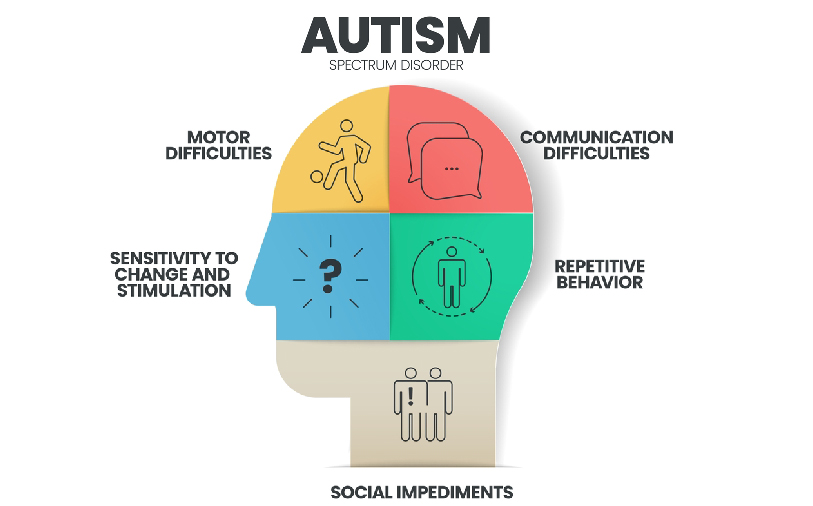Book an Appointment
Call Us+91 9319488481ASD involves a range of challenges, including difficulties with communication (both verbal and non-verbal), social interaction, behavior, and restricted or highly focused interests. Many are now seeking to get more specialized treatment due to increased awareness and education concerning autism. Having recognized the excellence of treating ASD, Hyderabad is the fourth largest city in India, offering a range of therapies and support systems that may improve quality of life.
This blog will discuss the causes, symptoms, types, and available treatment options for Autism Spectrum Disorder in Hyderabad.
 What is Autism Spectrum Disorder?
What is Autism Spectrum Disorder?ASD is a neurodevelopmental condition characterized by challenges in communication, social interaction, and behavior, but many individuals also demonstrate unique strengths and abilities. The term "spectrum" means symptoms and severities that vary considerably. While there are those whose manifestations are relatively mild, others suffer greatly. Signs of ASD typically appear in early childhood, though they can vary widely and may not always be noticeable until later in development.
Whereas the actual causes of autism spectrum disorder remain vague, with the passage of time and more research, many potential genetic, environmental, and neurobiological factors in the development of ASD have been found.
The causes of ASD are not yet fully understood, but it is believed to result from a combination of genetic and environmental factors. Some potential causes of autism spectrum disorder include:
These factors are commonly believed to contribute to ASD, but the specific causes are still being studied.
Also Read: Neuro Rehabilitation Center In Hyderabad
ASD varies significantly from person to person, which is why it's referred to as a 'spectrum. The three main types of autism spectrum disorder are classified into three:
Understanding these can help select appropriate treatment based on specific symptoms and challenges.
Also Read: Stroke Recovery Exercises From A Rehabilitation Center In Hyderabad
The symptoms of autism spectrum disorder usually appear by the time a child is 2 or 3 years old. Some symptoms, such as limited social engagement or delayed speech, can appear as early as 18 months. Symptoms include several and varied types: social communication/interaction problems and restricted or repetitive behaviors.
Social Communication and Interaction Symptoms:
Limited/repetitive behaviors include:
Other Symptoms:
Each individual with ASD may experience a unique combination of symptoms, making early diagnosis and intervention important for tailored care. Early diagnosis and intervention offer the best chance for individuals to reach their fullest potential, improving development and quality of life.
Also Read: Spinal Cord Injury Treatment In Hyderabad
Most treatments for ASD consist of a combination of various therapies working towards meeting the needs of the individual. Some of the more common Autism Spectrum Disorder treatment options available in Hyderabad include:
Speech and language therapy supports the development of the child's language comprehension and expressive communication, vocalization and social interaction.
Occupational therapy helps the day-to-day skills of the child, which are primarily based on fine motor coordination, sensory processing, and self-care, according to the child's developmental skills.
Physical therapy can improve coordination and balance and promote physical independence for children suffering from motor skill disorders.
Social skills training is helpful for children with autism, especially when such children fail to pick up social cues. This treatment educates and helps individuals acquire the proper social behavior.
While there is no cure for autism, medications can be helpful in managing certain symptoms such as anxiety or hyperactivity, supporting overall well-being.
Also Read: Why Physiotherapy Is Crucial For Spinal Cord Injury Patients?
Hyderabad has become a key destination for autism spectrum disorder treatment in India, offering personalized care, evidence-based therapies, and expert specialists. Several leading hospitals, special schools, and therapy centers in the city offer programs to cater to the divergent requirements of ASD patients. Autism treatment centers in Hyderabad adopt a holistic approach, integrating evidence-based therapies with complementary treatments to support the development of children on all levels. Hyderabad's state-of-the-art medical facilities and competitive treatment costs make it a popular destination for both local and international families seeking autism care.
Intervening early in the childhood of ASD children can provide impetus for enhancing various developmental outcomes. Good communication skills, social behaviors, and learning have been seen in many children who are attended to and treated early enough. Models such as the ESDM are implemented within 18 months of children's age and have seen good improvements in cognitive abilities and social development.
In Hyderabad, early intervention centers offer holistic assessment and therapy programs for young children with autism. These centers work closely with families to ensure every area of development is examined, providing a foundation for better life skills.
It can indeed be a tough job to find the right treatment center in Hyderabad, but there are several things to consider:
While Autism Spectrum Disorder is a lifelong condition, individuals with ASD can lead fulfilling and meaningful lives with the right care and support. The city of Hyderabad boasts more sophisticated centers in ASD treatment and access to adequate, compassionate, and comprehensive care for people with an autism spectrum disorder. Understanding the causes, symptoms, and treatment options for ASD can help families and caregivers make informed decisions to ensure the best possible outcomes. Explore autism spectrum disorder treatment options at Walk Again Rehab in Hyderabad.